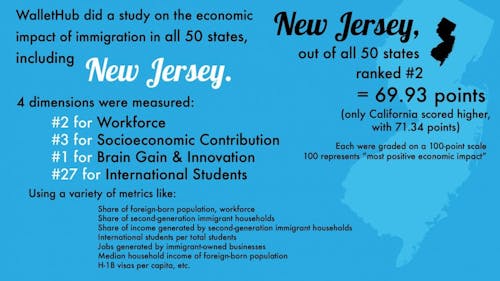State-by-state analysis shows immigrants in New Jersey have 2nd largest economic impact

Shortly after entering office, President Donald J. Trump signed two executive orders — one to begin construction of a concrete wall along the southern border, and another to bar all immigrants and refugees from seven countries from entering the U.S.
Hard hitting immigration reforms like these could have serious negative impacts on states’ economies, especially New Jersey's, according to a WalletHub study.
The study compared the level of impact of foreign-born populations on the economies of all 50 individual states. New Jersey ranked second on the list, preceded only by California.
A foreign-born person counts as anyone who is not a U.S. citizen at birth, including naturalized U.S. citizens, lawful permanent residents, temporary migrants, humanitarian migrants and unauthorized migrants, according to the U.S. Census Bureau.
Jill Gonzales, a WalletHub analyst who worked on the study, said it was a data-driven report that took into account well-known and trusted government sources such as the U.S. Census Bureau, the Bureau of Labor Statistics, the Department of Labor and the National Academy of Sciences.
“New Jersey is the state where immigrants have the second biggest economic impact as it has the highest share of foreign-born STEM workers at 41 percent and the highest number of work visas at 1,072 per 100,000 residents,” she said in an email. “Immigrants in New Jersey have the third highest median annual household income at $65,683 and the second highest share of income generated by immigrant households at just above 22 percent.”
Immigrants have brought value to the entire country, though states like New Jersey are more economically reliant on them than others, Gonzales said.
“Immigrants in New Jersey have generated jobs, created new businesses and contributed to the state's socioeconomic environment as a whole,” she said.
Jo-Leo W. Carney-Waterton, a professor in the Department of Political Science, said that New Jersey's foreign-born population’s impact on the state does not come as a surprise to him.
“When you consider how highly congested and highly saturated the labor market is in (New York City and Philadelphia) it only seems natural that (migrants) would come here to the state of New Jersey,” he said.
Since New Jersey gets the bulk of its foreign-born residents through legal immigration, Carney-Waterton said that he is not sure if the president’s border wall plan will have much of an impact on the state other than in its sanctuary cities.
“You are going to see certain pockets of New Jersey take a hit in terms of their workers, the question is, is it going to be made up by other individuals who are in low-skilled worker positions,” he said. “I suspect that the people who are yelling the loudest, and they are, are all of the corporate giants, particularly in the tech industry and in bio-research because they are paying (unauthorized migrants) a lesser wage.”
Carney-Waterton said that he is a strong supporter of cultural diversity at Rutgers.
“Far too many students are not culturally exposed,” he said. “At this campus, I mean I think just about every country is represented or at least represented by someone nearby, that’s an amazing opportunity to go and to see the rest of the world through someone else’s lens.”
Having students of varying cultures helps to enrich and enhance the educational atmosphere at Rutgers, Carney-Waterton said.
He said the University should be more proactive in financially assisting students who are going through the HB1 visa process.
An HB1 visa is an employment-based visa that is issued for eligible and qualified temporary workers.
“HB1 visas are expensive, and on top of that there is no guarantee that (migrants) are going to get one,” Carney-Waterton said.
Carney-Waterton said he is pro-immigration, but that legality and orderliness in terms of immigration are necessary.
“What I am concerned about is making sure that individuals who we know have been thoroughly vetted come in,” he said. “So individuals who have green cards at this point, we know they’ve been thoroughly vetted. That system is not foolproof by any stretch of the imagination, but I can assure you that you are not going to add anything to the green card system that’s going to make it foolproof.”
While he wants to see a more orderly and effective immigration system in place in the U.S., he said he does not want it to be at the sacrifice of the campus’ diversity.
“Students who grow up or are educated in homogenized systems, I think, are lacking,” Carney-Waterton said. “I’m just going to be honest about that, that one I’ll put on the record all day.”
Stephen Weiss is a School of Arts and Sciences sophomore majoring in philosophy. He is an associate news editor for The Daily Targum.



